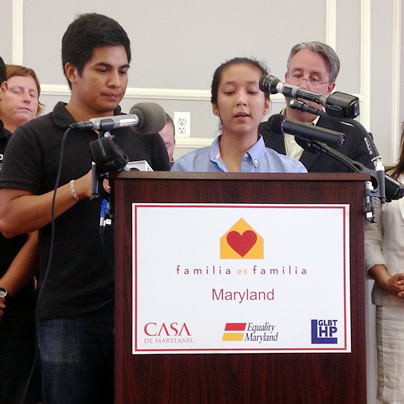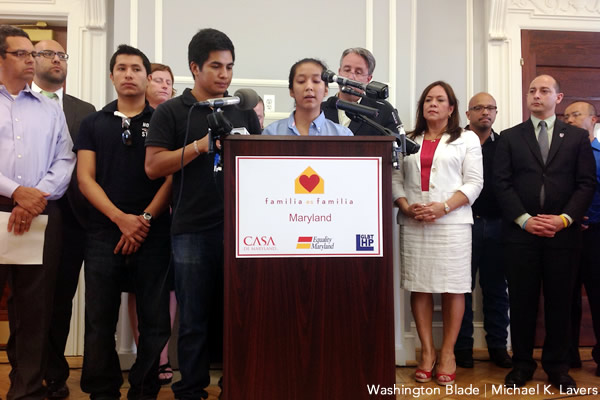National
LGBT advocacy groups join the immigration debate
Activists in Maryland and Oregon have collaborated with immigrant rights groups


Equality Maryland and CASA de Maryland unveil the Familia es Familia Maryland campaign on Aug. 28 (Blade photo by Michael K. Lavers)
Are there parallels between the LGBT and immigrants’ rights movements?
A new campaign that Equality Maryland and CASA de Maryland unveiled late last month that seeks to garner additional support for the state’s same-sex marriage law among Latinos and in-state tuition for undocumented immigrants among LGBT voters ahead of two referenda on the issues suggests that these issues share common threads. Carrie Evans, executive director of Equality Maryland, noted during the Aug. 28 press conference where she and other advocates formally unveiled the Familia es Familia Maryland initiative that her organization “must speak up for what is right and what is fair.”
“A majority of Latinos in Maryland support marriage equality for same-sex couples,” she told the Blade in a follow-up interview. A Hart Research Associates survey in July that shows 54 percent of Marylanders would vote for the same-sex marriage law in Novembers mirrors an April poll that the National Council of La Raza commissioned that indicates 54 percent of Latinos support nuptials for gays and lesbians. A Gonzales Research and Marketing survey in January noted that 48 percent of Maryland voters also support the state’s Dream Act. “Equality Maryland is working to ensure that a majority of LGBT communities of Maryland support Question 4.”
The long-standing partnership between Basic Rights Oregon and Causa, a statewide immigrant advocacy group, provided the blueprint upon which Equality Maryland and CASA de Maryland collaborated with the Latino GLBT History Project and other organizations to launch the Familia es Familia Maryland campaign. Jeana Frazzini, executive director of Basic Rights Oregon, told the Blade that her organization’s work with Causa stems from campaigns against anti-gay, anti-immigrant and anti-choice ballot initiatives in the Beaver State.
“Pretty early on the communities were put in a position to rely on one another, to share lessons learned and provide mutual support,” she said.
Frazzini noted that what she described as strong relationships between staffers at the two organizations have subsequently grown into “broader commitments in our missions and in our programmatic work.” This includes her group’s participation in the campaign against two anti-immigrant ballot initiatives in Columbia County in 2008.
“For an LGBT rights organization like Basic Rights Oregon, we need to have an understanding of the impact of immigrant policies on our own community in order to create the space for LGBT immigrants to find support and to feel as though they have a place in the LGBT movement as well as in the immigrant rights movement seeking to highlight the impact of policies on their LGBT members,” said Frazzini.
Causa is among the organizations that continue to advise Basic Rights Oregon on how to pursue marriage rights for same-sex couples in the state. Francisco Lopez, the group’s executive director, told the Blade that nuptials for gays and lesbians has become one of Causa’s core organizational values.
“We support each other politically. We support each other in terms of mobilization. We support each other’s attempts for fundraising. So what we did is to include marriage equality as a value of our organization,” he said. “More than just basing our issues, We decided that we needed to move into what are some of those common values we have — the value of justice, hope, dignity, family and we know family is a family and that’s when we decided this is something that we value as important.”
National LGBT organizations weigh in on immigration-related issues
The Human Rights Campaign, the National Gay and Lesbian Task Force and Immigration Equality are among the national LGBT advocacy groups that have spoken out in support of the inclusion of a bill that would allow gays and lesbians to sponsor their foreign-born partners and children for immigration under a comprehensive immigration reform package. These groups have also spoken out against Arizona’s controversial Senate Bill 1070 designed to deter undocumented immigrants from entering the state from Mexico.
The Gill Foundation has also backed public education campaigns on these issues through the Four Freedoms Fund.
“While our opponents try to drive wedges between communities, the truth is that LGBT people are not a monolith. Rather, we are racial and ethnic minorities, women, people with disabilities, and people of faith. The issues that impact these communities also impact us as LGBT people – because they are us, too,” said HRC spokesperson Michael Cole-Schwartz. “HRC stands with the coalition on comprehensive immigration reform for example, because same-sex couples are still deeply disadvantaged by our nation’s immigrations laws, and because undocumented LGBT people are incredibly vulnerable, with neither legal status nor protection from discrimination based on sexual orientation or gender identity.”
Darlene Nipper, deputy executive director of the National Gay and Lesbian Task Force, echoed Cole-Schwartz. She pointed out that her organization not only spoke out against SB 1070, but similar measures in Alabama and Georgia. Nipper further stressed that the Task Force continues to advocate for an LGBT-inclusive comprehensive immigration reform bill on Capitol Hill.
“We have this position of being both clearly a national LGBT organization but also one that is concerned about issues of racial justice, economic justice,” she said. “For us, immigration issues are central to our values in the organization so it’s easy for us to chime in on those.”
New York
Two teens shot steps from Stonewall Inn after NYC Pride parade
One of the victims remains in critical condition

On Sunday night, following the annual NYC Pride March, two girls were shot in Sheridan Square, feet away from the historic Stonewall Inn.
According to an NYPD report, the two girls, aged 16 and 17, were shot around 10:15 p.m. as Pride festivities began to wind down. The 16-year-old was struck in the head and, according to police sources, is said to be in critical condition, while the 17-year-old was said to be in stable condition.
The Washington Blade confirmed with the NYPD the details from the police reports and learned no arrests had been made as of noon Monday.
The shooting took place in the Greenwich Village neighborhood of Manhattan, mere feet away from the most famous gay bar in the city — if not the world — the Stonewall Inn. Earlier that day, hundreds of thousands of people marched down Christopher Street to celebrate 55 years of LGBTQ people standing up for their rights.
In June 1969, after police raided the Stonewall Inn, members of the LGBTQ community pushed back, sparking what became known as the Stonewall riots. Over the course of two days, LGBTQ New Yorkers protested the discriminatory policing of queer spaces across the city and mobilized to speak out — and throw bottles if need be — at officers attempting to suppress their existence.
The following year, LGBTQ people returned to the Stonewall Inn and marched through the same streets where queer New Yorkers had been arrested, marking the first “Gay Pride March” in history and declaring that LGBTQ people were not going anywhere.
New York State Assemblywoman Deborah Glick, whose district includes Greenwich Village, took to social media to comment on the shooting.
“After decades of peaceful Pride celebrations — this year gun fire and two people shot near the Stonewall Inn is a reminder that gun violence is everywhere,” the lesbian lawmaker said on X. “Guns are a problem despite the NRA BS.”
New York
Zohran Mamdani participates in NYC Pride parade
Mayoral candidate has detailed LGBTQ rights platform

Zohran Mamdani, the candidate for mayor of New York City who pulled a surprise victory in the primary contest last week, walked in the city’s Pride parade on Sunday.
The Democratic Socialist and New York State Assembly member published photos on social media with New York Attorney General Letitia James, telling followers it was “a joy to march in NYC Pride with the people’s champ” and to “see so many friends on this gorgeous day.”
“Happy Pride NYC,” he wrote, adding a rainbow emoji.
Mamdani’s platform includes a detailed plan for LGBTQ people who “across the United States are facing an increasingly hostile political environment.”
His campaign website explains: “New York City must be a refuge for LGBTQIA+ people, but private institutions in our own city have already started capitulating to Trump’s assault on trans rights.
“Meanwhile, the cost of living crisis confronting working class people across the city hits the LGBTQIA+ community particularly hard, with higher rates of unemployment and homelessness than the rest of the city.”
“The Mamdani administration will protect LGBTQIA+ New Yorkers by expanding and protecting gender-affirming care citywide, making NYC an LGBTQIA+ sanctuary city, and creating the Office of LGBTQIA+ Affairs.”
U.S. Supreme Court
Supreme Court upholds ACA rule that makes PrEP, other preventative care free
Liberal justices joined three conservatives in majority opinion

The U.S. Supreme Court on Friday upheld a portion of the Affordable Care Act requiring private health insurers to cover the cost of preventative care including PrEP, which significantly reduces the risk of transmitting HIV.
Conservative Justice Brett Kavanaugh authored the majority opinion in the case, Kennedy v. Braidwood Management. He was joined by two conservatives, Chief Justice John Roberts and Justice Amy Coney Barrett, along with the three liberal justices, Sonia Sotomayor, Elena Kagan, and Ketanji Brown-Jackson.
The court’s decision rejected the plaintiffs’ challenge to the Affordable Care Act’s reliance on the U.S. Preventative Services Task Force to “unilaterally” determine which types of care and services must be covered by payors without cost-sharing.
An independent all-volunteer panel of nationally recognized experts in prevention and primary care, the 16 task force members are selected by the secretary of the U.S. Department of Health and Human Services to serve four-year terms.
They are responsible for evaluating the efficacy of counseling, screenings for diseases like cancer and diabetes, and preventative medicines — like Truvada for PrEP, drugs to reduce heart disease and strokes, and eye ointment for newborns to prevent infections.
Parties bringing the challenge objected especially to the mandatory coverage of PrEP, with some arguing the drugs would “encourage and facilitate homosexual behavior” against their religious beliefs.
-

 U.S. Supreme Court4 days ago
U.S. Supreme Court4 days agoSupreme Court upholds ACA rule that makes PrEP, other preventative care free
-

 U.S. Supreme Court4 days ago
U.S. Supreme Court4 days agoSupreme Court rules parents must have option to opt children out of LGBTQ-specific lessons
-

 Congress5 days ago
Congress5 days agoSenate parliamentarian orders removal of gender-affirming care ban from GOP reconciliation bill
-

 District of Columbia5 days ago
District of Columbia5 days agoMan sentenced to 15 years in prison for drug deal that killed two DC gay men








